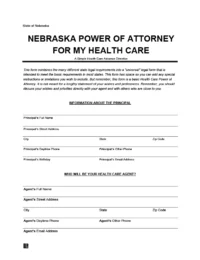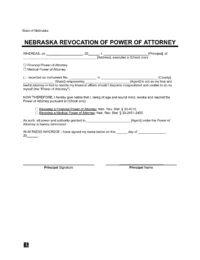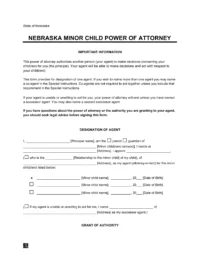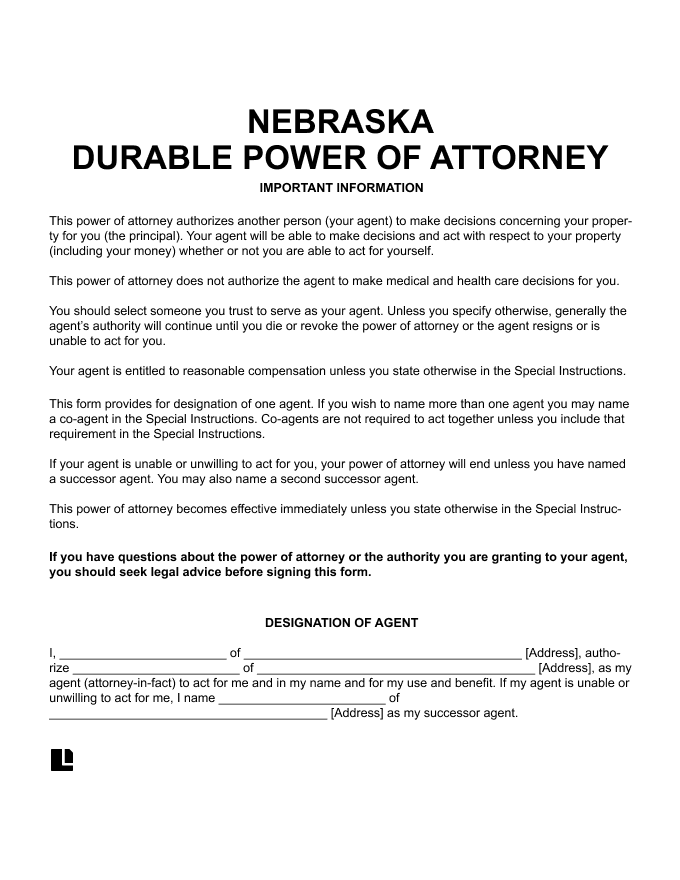A Nebraska durable (statutory) power of attorney form is a legal document authorizing an individual—known as the agent—to make financial-related decisions on behalf of another individual—known as the principal. This is a durable form, which means that it remains effective even if the principal becomes incapacitated.
Laws
In Nebraska, power of attorney forms are durable by default.
- Relevant Laws: §§ 30-4001 — 30-4045 (Nebraska Uniform Power of Attorney Act).
- Presumed Durable: Yes — § 30-4004.
- Signing Requirements: The Principal’s signature is required and should be acknowledged in the presence of a notary public (§ 30-4005).
- Notarization: A durable power of attorney must be notarized in Nebraska (§ 30-4005).
- Statutory Form: Yes — § 30-4041.
Definitions
Durable – “Durable, with respect to a power of attorney, means not terminated by the principal’s incapacity” (§ 30-4002(3)).
Power of Attorney – “Power of attorney means a writing or other record that grants authority to an agent to act in the place of the principal, whether or not the term power of attorney is used” (§ 30-4002(8)).
Specific Powers and Limitations
Restrictions on Gifts and Transfers
What an Agent Can Do
- Meaningful Gifts: An agent might have the power to give monetary gifts to family members for special occasions like birthdays or weddings, or to support their education. It’s also possible to continue the principal’s tradition of donating to their favorite charities.
- Transfer Property or Shares: To help achieve the principal’s estate planning goals, they might be authorized to transfer the title of properties or shares (see Nebraska Revised Statute § 30-4034).
Things to Consider
- Stay True to Their Wishes: Any gift or transfer should reflect the principal’s past behavior and their estate planning aims. It’s crucial these actions don’t jeopardize their financial security or care needs. No act should be taken that is against the principal’s express wishes.
- Avoid Financial Harm: Gifts should not impact the principal’s financial health negatively. The document can include guidelines on the size and frequency of gifts to prevent misuse of assets (see § 30-4040).
Agent’s Authority Limitations
- Respect the Estate Plan: You’re typically not allowed to make changes that would significantly alter the principal’s estate plan, like modifying beneficiary designations or creating a will or other estate planning document, without clear permission.
- Act in Their Best Interest: Your actions should always benefit the principal, avoiding personal gain from your position unless the DPOA explicitly allows it.
Other Limitations
Other limitations can be specific to the agreement, it might grant or limit your powers in other areas, such as making decisions about the principal’s health care, where they live, or their business matters.
Revocation and Termination
A Durable Power of Attorney in Nebraska can be revoked by the principal at any time, as long as the principal is competent. Here’s how:
- Write It Down: To cancel or change, you need to put it in writing.
- Tell the Right People: Make sure the person you’ve given power to (your agent) knows about your decision. It’s also important to inform banks, doctors, or anyone else who might be working with your agent.
- What Happens When You Pass Away: The DPOA stops working the moment you die. It’s not something that carries on after death.
When Someone Else Steps In: There are situations where your agent might not be able to make decisions for you anymore, like if they’re not doing a good job, if they’re sick and can’t make decisions themselves, or if they decide they no longer want to be your agent. If there’s no backup agent named, your DPOA won’t work anymore. In serious cases, a court might step in if your agent isn’t acting in your best interest.
Safekeeping and Registration
Nebraska does not maintain a state-wide registry for Durable Powers of Attorney. So it’s up to you to keep the original document safe. Here are some tips:
- Make sure you, your agent, and any key places like banks or hospitals have a copy.
- Some people choose to file their document with their local county office. This isn’t required, but it can make things easier in some cases.
Additional Resources
For more information on Durable Powers of Attorney in Nebraska, the following resources can be helpful:
- State Bar Association Website: Provides guidance on Durable Powers of Attorney, including legal requirements and best practices.
- Nebraska Judicial Branch: for helpful information on financial power of attorneys.
- Legal Aid Organizations: Organizations such as Legal Aid of Nebraska offer assistance and can provide legal advice regarding Durable Powers of Attorney.
Related Forms
Medical Power of Attorney
Signing Requirements: Two witnesses or a notary public. (§ 30-3404).
Revocation of Power of Attorney
Signing Requirements: Notary public. (§ 30-4005).
Minor (Child) Power of Attorney
Signing Requirements: Notary public.



